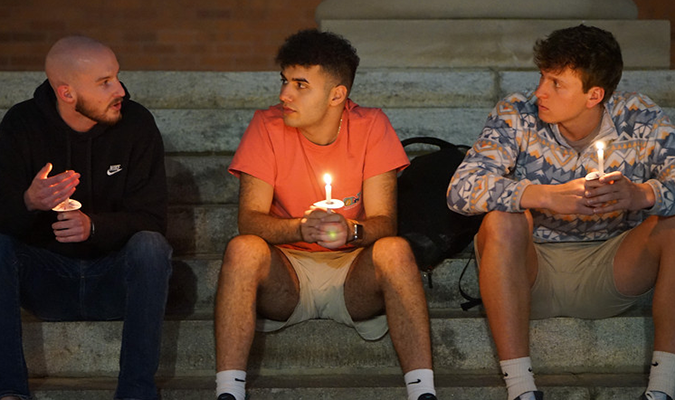How to Help
-
What to Say and Do
There are actions you can take to help prevent suicide.
-
Take the warning signs seriously. Do not ignore the signs in hopes they will go away.
-
Reach out. Show your concern. Don't worry about saying the wrong thing. Your genuine concern is what is important.
-
Ask if the person is thinking about suicide. Be direct. Be persistent and sensitive to solicit an answer.
-
Convey hope to the person who is struggling. Hope is the best defense against suicide.
-
Listen and accept the person's feelings calmly and without judgment.
-
Do not act shocked or argue with the person.
-
Don’t be sworn to secrecy.
-
Know the resources at Clemson University and in our community.
-
Offer to go with the person for help.
-
Do not leave the person alone. Find someone else who can help, such as family, friends, a religious leader, the Counseling Center (CAPS), a resident advisor or campus security.
-
File a CARE Report to link the person to university services
Tigers Together offers advocacy training to help groups and individual members of the Clemson family to become Suicide Prevention advocates.
Seize the Awkward – find out if your friend is struggling with their mental health
-
-
What If...
"What if the person refuses help or doesn't want me to tell anyone?”
-
Do not be sworn to secrecy.
-
Safety takes priority over confidentiality.
-
Talk to the professionals (Residence Life, Dean of Students, Campus Safety, 911, Police, CAPS, etc.)
-
Do not share unnecessary information with friends (gossip)
“What if a person is expressing suicidal wishes on social media?”
-
Offer hope and share resources
-
Report the concerns to the social media site’s safety team
-
Get Help Now for an immediate concern
For a non-emergency at Clemson, complete a CARE Network referral form to link the person to University services
-
-
Clemson University Counseling and Psychological Services (CAPS)
Clemson University Counseling and Psychological Services (CAPS)
For psychological emergencies, CAPS counselors are available for crisis assistance and consultation 24/7. During normal office hours (8 a.m.-4:30 p.m. Monday, Tuesday, Thursday, Friday and 9 a.m.-4:30 p.m. Wednesday), contact the CAPS office at 864-656-2451 or walk into the CAPS office with the student and request that the student be seen on an emergency visit.
For psychological emergencies after hours and on weekends, a counselor can be reached by calling CAPS at 864-656-2451 and selecting option 2. A counselor will be available to speak with you shortly. In case of emergency where immediate police or emergency medical services are needed, call 911.
-
CARE Network
The Care Network is a way to reach out to the Office of Advocacy and Success to communicate incidents deemed critical and/or may indicate unusual or harmful student behavior or trends. Students, faculty, staff or parents can use the Care Network by filling out an online referral form. The Office of Advocacy and Success staff will review and determine appropriate next steps for ALL complete CARE referrals within one business day.
- Social Media
-
For Faculty/Staff
Crisis protocol
Clemson University maintains a Crisis Management Plan. Learn about the Crisis Management Plan and the Clemson University Crisis Management Team.
What to say and do
Clemson University provides guidance on handling student threats to self/others, as well as working with students in distress.
- For Families

